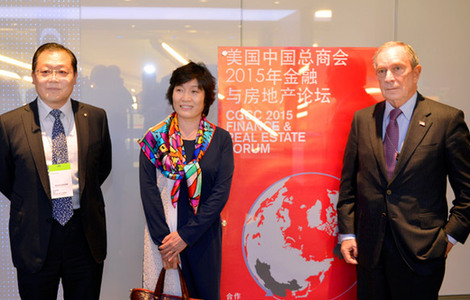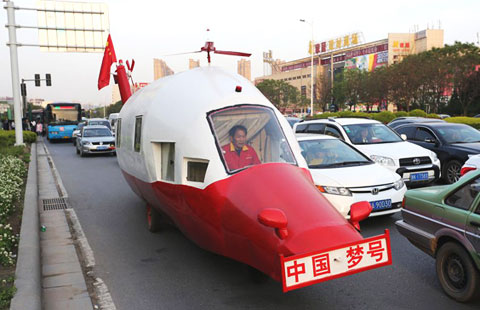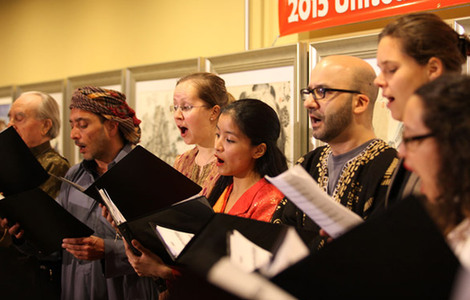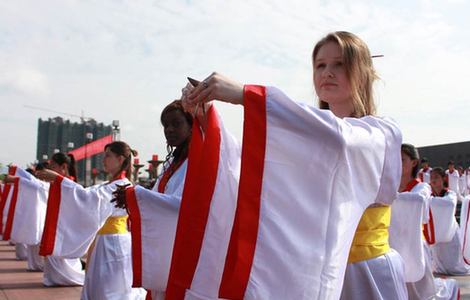Milestone for HK democracy
Updated: 2015-04-23 07:52
(China Daily)
|
||||||||
|
People walk past a banner written by pro-democracy protesters at the area occupied by protesters at Causeway Bay in Hong Kong December 14, 2014. Banner reads "I want real universal suffrage". [Photo/Agencies] |
By tabling a draft resolution on its electoral reform blueprint in the Legislative Council on Wednesday, the government of the Hong Kong Special Administrative Region has taken another crucial step toward realizing universal suffrage in the city.
Democracy eluded Hong Kong during its one-and-a-half-century colonial era. All of its 28 colonial governors throughout those decades were appointed by the British monarch, who had the exclusive power to appoint the members of the colonial legislature.
Implementing the reform would mean in the space of merely 20 years - between 1997 and 2017 - Hong Kong would have moved from having a British governor "parachuted in" by the British monarch to a leader chosen by its 5 million eligible voters.
Selecting the chief executive by "one person, one vote" is the common aspiration of the central authorities, the SAR government, as well as the people of Hong Kong. For this aspiration to become reality, the SAR government needs to secure the endorsement of its electoral reform plan by the opposition lawmakers.
Unfortunately, the opposition lawmakers, who enjoy a critical minority in the legislature, reiterated on Wednesday their vow to veto the government's electoral reform blueprint. They insisted that the proposed package, which is in conformity with the Basic Law and the legal framework laid down by the Standing Committee of the National People's Congress on Aug 31 last year, did not meet "international standards".
But such standards are purely academic. The NPCSC's legal framework, designed specifically in the context of Hong Kong as a special administrative region of China under the "One Country, Two Systems" policy, is in keeping with the reality of the city. It is intended to help maintain the SAR's social stability and prosperity by ensuring that it is run only by patriots. A veto by the opposition lawmakers might serve the interests of some quarters of society, but it would not be in Hong Kong's overall interests.
Failure to push through the electoral reform plan would create a toxic political environment that would only make it impossible for the SAR government to restart the process for constitutional reform anytime soon.

 Chinese real estate deals in US topical forum
Chinese real estate deals in US topical forum
 Weird stuff you can buy on Taobao
Weird stuff you can buy on Taobao
 Top 5 wealthiest women in world's tech sector
Top 5 wealthiest women in world's tech sector
 Outsiders challenge traditional smartphone makers
Outsiders challenge traditional smartphone makers
 Helicopter replica on the road
Helicopter replica on the road
 Singing Chinese language's praises
Singing Chinese language's praises
 Foreign girls join in ancient Chinese coming-of-age ritual
Foreign girls join in ancient Chinese coming-of-age ritual
 Shanghai auto show kicks off
Shanghai auto show kicks off
Most Viewed
Editor's Picks

|

|

|

|

|

|
Today's Top News
China sustains US cities: Bloomberg
Real estate investors may switch focus: panel
Obama submits nuclear energy cooperation deal with China
US urges Japan to handle wartime history in constructive way
Mexico bans poultry, egg imports from bird flu-hit Iowa
Bloomberg: Chinese investment sustains US cities
China, Pakistan elevate ties, commit to long-lasting friendship
'Belt-Road' to exchange goodwill with economic coopertation
US Weekly

|

|






